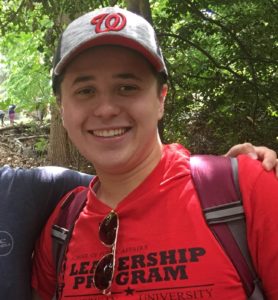During the summers of college, I had nowhere to live. My parents divorced in the summer before my freshman year, which lead me to couch surf at my friends and grandparents house for 3 months (note: I firmly believe my grandparents couch, which they donated two years later, could beat any bed despite it being from the 1970s). Fortunately, my RA shared a job posting on campus that included employer-sponsored housing. I jumped at the opportunity despite already having a full-time job at Whole Foods. That summer I worked about 70 hours a week, and absolutely loved the self-growth.
Anyways, the position was a 24/7 front desk employee for the dorms which operate more like hotels during the summer. I worked the graveyard shift, which meant I had to problem solve A LOT before being forced to make the rare late-night phone call that would surely wake up the person on call. I enjoyed the position a lot as the guests were mostly very nice. My favorite memory was training a fellow employee and checking in 100+ guests from countries other than the United States who did not speak English between 1am-5am. After my first summer, I was offered a student supervisor position. The office job resembled being an administrative assistant more than supervisor. I candidly spoke with the director of the department, who recommended I reach out to the University Police Department about a possible position. Although law enforcement was not exactly my passion at that point, I headed her advice and ultimately started there in 2018 as a training and logistics specialist.
At first, it was my duty to handle the logistics and technology of the Campus Police Academy for all of DC, which AU was hosting that year, but I started to study the lessons and built bonds with the recruits. Ultimately, I became their primary tutor for everything from D.C. Criminal Code to Defensive Tactics.
With each Academy session I retained my responsibilities and added some more:
-
-
- 2018-01 (May – August 2018)
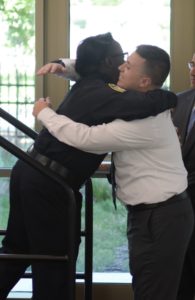
-
- Logistics Coordinator and Primary Tutor
-
- 2019-01 (December – March 2019)
-
- Exam Writer and Secondary Instructor
-
- 2019-02 (May – August 2019)
-
- Administrative Coordinator and Master Scheduler
-
- 2020-01 (December – March 2020)
-
- Primary Instructor for D.C. Code
-
- 2018-01 (May – August 2018)
-
Some of my key accomplishments included:
-
-
- Wrote over 25 Exams with a total of 1500 questions that proofed recruits meeting training objectives
- Evaluated and re-organized the curriculum
- Contributed to improving the 57% graduation rate in 2018-01 to 100% in 2019-02 and 2020-01
- Coordinated guest lectures from the U.S. Department of State, National Capital Region Threat Intelligence Consortium, D.C. Government Agencies and Campus Partners
- Taught ALL of D.C. Criminal Code in 2020-01 including over 40 Hours of Instruction and 150+ criminal codes
- In 2020-01, I was the top-ranked Academic instructor for Consistently Engaging Audience according to an anonymous survey of recruits
-
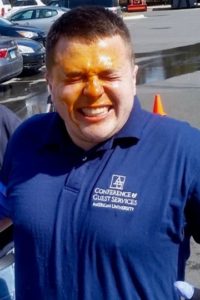 My favorite memory was getting pepper sprayed with a highly concentrated law enforcement-only blend of oleoresin capsicum and completing a 2-minute obstacle course after.
My favorite memory was getting pepper sprayed with a highly concentrated law enforcement-only blend of oleoresin capsicum and completing a 2-minute obstacle course after.
Working at AUPD was an experience that I am eternally grateful for. It led me to intern at the Metropolitan Police Department, George Washington University Police, and consult on security training for a large hospital system. My coworkers took the job very seriously, but always made time or a laugh or friendly conversation. My responsibilities grew exponentially while at AUPD, which allowed me to try new things and learn more than I could ever imagine.

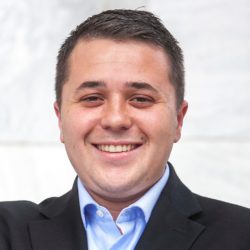
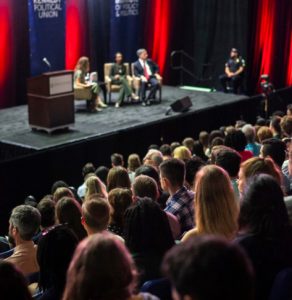
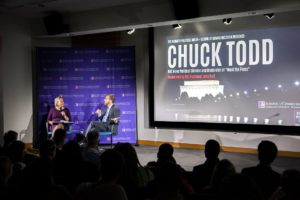
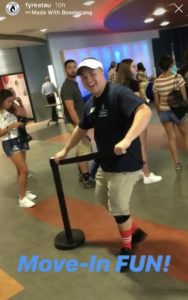 I came up with a solution to this problem from watching The Suite Life of Zack and Cody. Zack and Cody lived in a fancy penthouse in New York City. At their home, an elevator attendant controlled where the elevator went, no matter if someone was calling it. This mode is called “independent mode.” I saw a keyhole that allowed for AU’s elevators to be switched from normal to independent mode and realized this would make the process much faster. I contacted my supervisor who pushed off my idea. He was very stressed and ignored my idea. I then took the risk and directly called Facilities Management to change the elevator mode. I explained my role and my idea. They agreed that it could make the process go much faster. Within a few minutes, the elevator technician made the switch with his key. About 20 minutes later, the 400+ car line was reduced to only 10. The process was almost working too well as staff began eagerly looking for work. The contracted lead for the moving company acknowledged that my proactive response and idea is what fixed the issue. The higher ups shrugged his comments off.
I came up with a solution to this problem from watching The Suite Life of Zack and Cody. Zack and Cody lived in a fancy penthouse in New York City. At their home, an elevator attendant controlled where the elevator went, no matter if someone was calling it. This mode is called “independent mode.” I saw a keyhole that allowed for AU’s elevators to be switched from normal to independent mode and realized this would make the process much faster. I contacted my supervisor who pushed off my idea. He was very stressed and ignored my idea. I then took the risk and directly called Facilities Management to change the elevator mode. I explained my role and my idea. They agreed that it could make the process go much faster. Within a few minutes, the elevator technician made the switch with his key. About 20 minutes later, the 400+ car line was reduced to only 10. The process was almost working too well as staff began eagerly looking for work. The contracted lead for the moving company acknowledged that my proactive response and idea is what fixed the issue. The higher ups shrugged his comments off.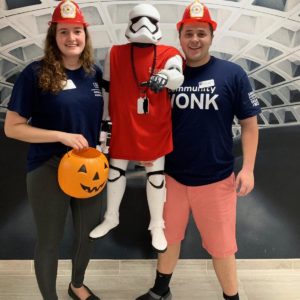 Rather that dwelling on my struggle with hosting events, I thought about what the purpose of hosting events. I realized that the purpose was to check in with residents and encourage inter-personal relationships. With this, I worked to build unique relationships with my residents. I brought in my peers who were officers in clubs to speak about their experiences. I strayed away from hosting corny events and moved towards hosting events that were relevant in American culture and student life in the particular week.
Rather that dwelling on my struggle with hosting events, I thought about what the purpose of hosting events. I realized that the purpose was to check in with residents and encourage inter-personal relationships. With this, I worked to build unique relationships with my residents. I brought in my peers who were officers in clubs to speak about their experiences. I strayed away from hosting corny events and moved towards hosting events that were relevant in American culture and student life in the particular week.